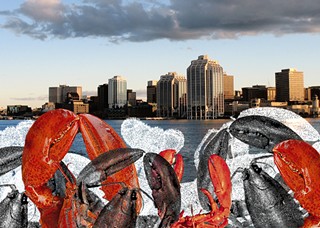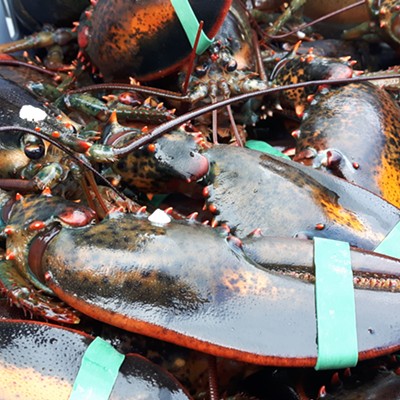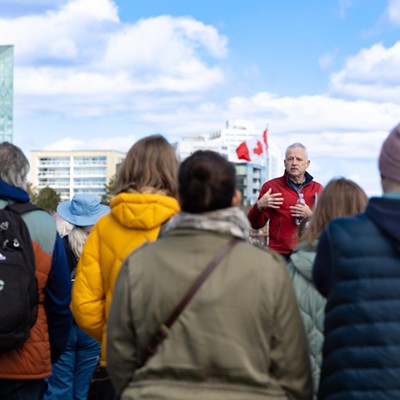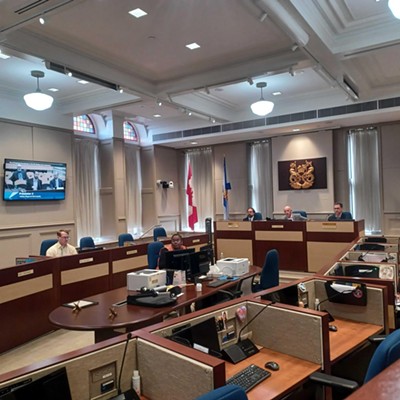Since the Halifax waste treatment plant failed in January, more than 100 million litres of raw sewage has been discharged into Halifax Harbour daily.
Worse still, last month the screens at the sewage outfalls were removed, so the sewage includes lots of "floatables," the toilet paper and tampon applicators that rise to the surface.
Is this a problem?
Environment Canada thinks so. "We received a number of complaints from the public, and after reviewing the information provided to us and gathering some further information, we felt the case warranted an investigation," says York Friesen, Environment Canada's manager of inspections for the Atlantic region. That ongoing investigation is focused on the pollution prevention provisions of the Fisheries Act, which deal with water quality where fish exist.
But Environment Canada doesn't look at the actual health of the fish in those waters. Lobster season for this part of the coast ended on May 31, but before then, commercial lobster trappers were working up and down the harbour and in the Northwest Arm. Moreover, harbour water is used in the lobster pounds for both Clearwater and Fisherman's Market, the two largest lobster processors in the province.
Regulation of where and when people fish lobster is handled by the federal Department of Fisheries and Oceans, but those regulations reflect market and overall population considerations, and not the health of particular lobsters. The Canadian Food Inspection Agency regulates food production, but doesn't care where lobsters are caught.
"Lobsters aren't like clams and mussels, which are filter feeders---for those we consume the whole animal, including the stomach, and they can accumulate bacterial contaminants, and that's why we have strict regulations where one can harvest," explains Heather Leslie, regional coordinator with CFIA. "But the parts of the lobster we eat don't accumulate bacterial contaminants---there is no risk of bacterial illness for the person consuming them."
Leslie says Health Canada suggests people limit the consumption of the lobster tomalley (the liver/pancreas), but that concern is related to marine biotoxins, and not to bacteria.
CFIA regulates for health and safety at the processing plants, but so far as live lobsters go, the agency only makes sure that the lobsters meet the requirements of the countries they are exported to.
"There aren't actually any requirements for the holding water quality---for the holding water in the pounds," explains Leslie.
Water quality in the pounds isn't an issue, says Catherine Boyd, Clearwater's manager of corporate affairs. "We have a filtration system that filters all water coming in, and we have biologists on staff to test the water quality on a regular basis."
While regulatory agencies and exporters say the lobsters are safe, isn't there a threat, rightly or wrongly, that the reputation of the entire industry can be sullied by a tiny amount of lobster caught in the harbour? Evidently not---Clearwater has no intention of "telling people where they can fish," says Boyd, and the Nova Scotia Department of Fisheries has no concern about the lobster market related to Halifax's sewage problem, says spokesperson Celeste Sulliman.
Likewise, even though one of the sewage outfalls is adjacent to the cruise ship docks, the provincial Department of Tourism has initiated no campaign related to the sewage issue, and isn't worried about it.
"We have had a few questions from visitors about the problem," says spokesperson Dave Denny. "But no one saying that they're not returning, or that sort of thing."
On April 27, Environment Canada ordered the city to give the agency a report on the sewage situation within 30 days, and to follow that with progress reports every 60 days, says Friesen. The first of those reports has been received but, citing confidentiality laws, Friesen would not release it.
As well, a city report on possible fixes hasn't been made public. That secrecy ill serves the public, says Darce Fardy, founder of the Nova Scotia Right to Know Coalition. "The cleanup of our harbour provides council with an excellent opportunity to adopt a policy of full disclosure on a matter of such enormous public interest," he says.

















